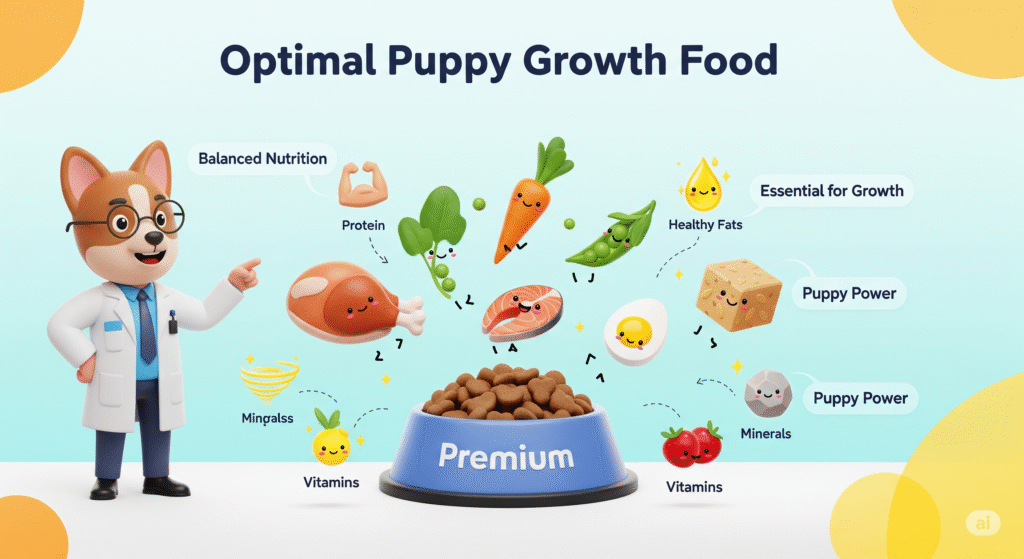
Bringing a puppy home marks the beginning of an exciting and rewarding journey. Along with training, socialization, and playtime, one of the most important responsibilities is ensuring your puppy receives the right nutrition for healthy growth. Puppies go through rapid physical and mental development during their first year, and the food they eat plays a major role in how strong, active, and healthy they become as adults. Canine nutritionists emphasize that choosing the best food for puppy growth is one of the most valuable investments a pet owner can make.
Why Nutrition Matters for Growing Puppies
Puppies require more calories, protein, vitamins, and minerals than adult dogs because their bodies are constantly developing. Their muscles, bones, immune system, and brain need specific nutrients in the right amounts to grow properly. Poor nutrition during the early stages of life can lead to stunted growth, weakened immunity, and long-term health problems. This is why experts recommend specially formulated puppy food rather than adult dog food, which may not provide the necessary nutrient balance.
Essential Nutrients Puppies Need for Healthy Growth
Canine nutritionists often stress that a high-quality puppy diet should contain:
- Protein – Supports muscle development and repair. Ideally, it should come from high-quality animal sources such as chicken, lamb, or fish.
- Fats – Provide energy and help maintain healthy skin and a shiny coat. Omega-3 fatty acids also support brain and eye development.
- Carbohydrates – Supply energy and aid digestion when coming from wholesome sources like sweet potatoes, rice, or oats.
- Calcium and Phosphorus – Crucial for building strong bones and teeth, especially in large-breed puppies.
- Vitamins and Minerals – Support immunity, metabolism, and overall health.
- DHA (Docosahexaenoic Acid) – An important omega-3 fatty acid that promotes cognitive development and vision health.
Wet Food vs. Dry Food for Puppy Growth
Both wet and dry puppy food have unique benefits. Wet food is often more flavorful and hydrating, making it a good choice for picky eaters. Dry kibble, on the other hand, helps maintain dental health and is more convenient to store and serve. Many nutritionists recommend combining both to provide variety and ensure your puppy enjoys mealtime while still benefiting from the advantages of each type.
Large Breed vs. Small Breed Puppy Food
Not all puppies grow at the same rate, and breed size plays a big role in choosing the right food. Large-breed puppies require carefully balanced calcium and phosphorus levels to prevent overly rapid growth that can lead to joint problems later in life. Small-breed puppies have faster metabolisms and may need calorie-dense food to keep their energy levels up. Always check the packaging to ensure the food is formulated for your puppy’s specific breed size.
Veterinarian and Nutritionist-Recommended Puppy Food Brands
While there are many puppy foods on the market, canine nutritionists frequently recommend brands that meet strict quality and safety standards. Some popular choices include:
- Hill’s Science Diet Puppy
- Royal Canin Puppy
- Purina Pro Plan Puppy
- Blue Buffalo Life Protection Puppy Formula
- Wellness Complete Health Puppy
These brands are known for using quality ingredients, balancing nutrients according to growth needs, and following guidelines set by the Association of American Feed Control Officials (AAFCO).
How to Transition to a New Puppy Food
If you decide to switch your puppy’s food, do so gradually over 7–10 days. Start by mixing a small amount of the new food with the old, gradually increasing the portion of the new food each day. A sudden switch can upset your puppy’s stomach and cause digestive issues.
Feeding Schedule for Optimal Growth
Puppies generally need three to four meals a day until they are about six months old. After that, you can transition to two meals a day. Feeding at the same times each day helps regulate digestion, energy levels, and potty training. Avoid leaving food out all day, as this can encourage overeating.
Treats and Supplements
While treats can be a useful training tool, they should never make up more than 10% of your puppy’s daily calories. Choose healthy, low-calorie treats, and avoid human foods that may be harmful to dogs. Supplements are not usually necessary if your puppy is eating a balanced, high-quality diet, but your veterinarian can guide you if your puppy has specific health needs.
Signs Your Puppy’s Food is Supporting Healthy Growth
When your puppy is getting the right nutrition, you’ll notice clear signs:
- Steady, healthy weight gain
- A shiny, soft coat
- Bright, clear eyes
- Good energy levels
- Regular, firm stools
If your puppy is underweight, lethargic, has a dull coat, or experiences frequent digestive issues, it may be time to re-evaluate their diet with the help of a veterinarian or nutritionist.
Final Thoughts
Choosing the best food for puppy growth is about more than just picking a popular brand — it’s about understanding your puppy’s unique needs and providing the nutrients required for a strong, healthy start in life. By consulting with canine nutritionists, following feeding guidelines, and paying attention to your puppy’s development, you can set them up for a lifetime of health and happiness. PetsDogPuppy
